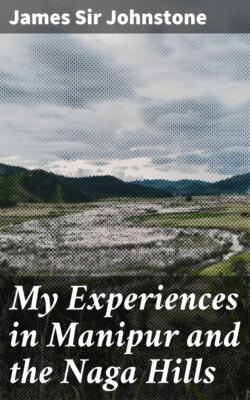Читать книгу My Experiences in Manipur and the Naga Hills - Sir James Johnstone - Страница 9
На сайте Литреса книга снята с продажи.
Kukis.
ОглавлениеTable of Contents
The Kukis are a wandering race consisting of several tribes who have long been working up from the South. They were first heard of as Kukis, in Manipur, between 1830 and 1840; though tribes of the same race had long been subject to the Rajah of Manipur. The new immigrants began to cause anxiety about the year 1845, and soon poured into the hill tracts of Manipur in such numbers, as to drive away many of the older inhabitants. Fortunately, the political agent (at this time Lieutenant afterwards Colonel McCulloch)2 was a man well able to cope with the situation. Cool and resolute, he at once realised and faced the difficulty. Manipur in those days, owing to intestine quarrels, could have done nothing, and the Rajah Nur Singh gladly handed over the management of the new arrivals to him.
Seeing that the Kukis had been driven north by kindred but more powerful tribes, and that their first object was to secure land for cultivation; McCulloch, as they arrived, settled them down, allotting to them lands in different places according to their numbers, and where their presence would be useful on exposed frontiers. He advanced them large sums from his own pocket, assigning different duties to each chief’s followers. Some were made into irregular troops, others were told off to carry loads according to the customs of the state. Thus in time many thousands of fierce Kukis were settled down as peaceful subjects of Manipur, and Colonel McCulloch retained supreme control over them to the last. So great was his influence, that he had only to send round his silver mounted dao (Burmese sword) as a kind of fiery cross, when all able-bodied men at once assembled at his summons.
Colonel McCulloch’s policy of planting Kuki settlements on exposed frontiers, induced the Government of Bengal to try a similar experiment, and a large colony of Kukis were settled in 1855 in the neighbourhood of Langting, to act as a barrier for North Cachar against the raids of the Angami Nagas. The experiment answered well to a certain extent, and would have answered better, had we been a little less timid. The Kukis are strictly monarchical, and their chiefs are absolutely despotic, and may murder or sell their subjects into slavery without a murmur of dissent. Their original home cannot be correctly ascertained, but there seem to be traces of them as far south as the Malay peninsula. They are readily distinguishable from the Nagas, and are braver men. Their women are often very fair, and wear their hair in a long thick plait down the back. The men are mostly copper coloured, and have often good features.
